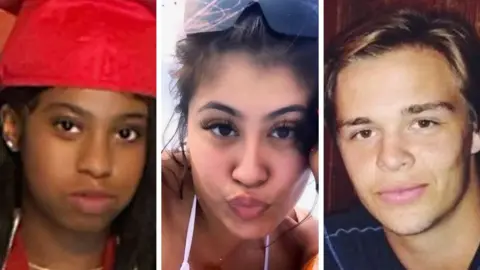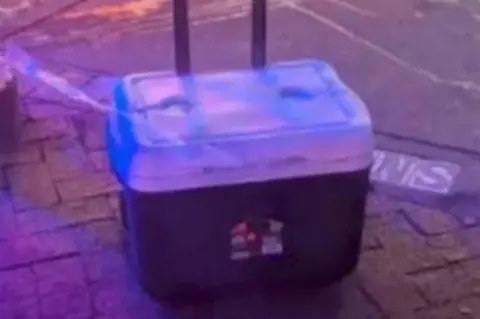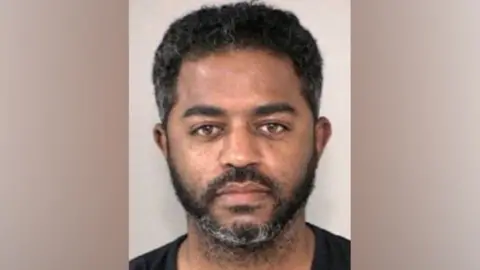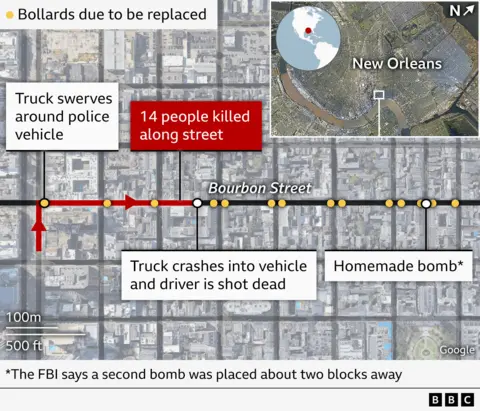New Orleans attacker wore Meta smart glasses - what else do we know?
The perpetrator of a deadly New Year's Day attack in New Orleans visited the Louisiana city twice in the months before the attack and wore Meta smart glasses as he apparently scoped out the scene and during the incident itself, the FBI has said.
Shamsud-Din Jabbar also travelled to Egypt and Canada in 2023, though it is not yet clear if those trips were linked to the plot, said investigators.
Fourteen people died and at least 35 more were injured as the driver of the pick-up truck targeted revellers in the French Quarter, in an attack that US officials say was inspired by the Islamic State (IS) group.
Here's what we know so far.

How did the attack unfold?
At 03:15 local time on New Year's Day, Jabbar drove a pick-up truck through crowds gathered on Bourbon Street - known globally as one of the largest places for New Year's Eve parties - in the heart of New Orleans' French Quarter.
Wearing a ballistic vest and helmet, the former US Army soldier got out of the car and began firing at police officers, injuring two, investigators said.
He died following the gunfight with three responding officers, the FBI said.
 Reuters
ReutersA couple of hours before the attack, Jabbar placed two improvised explosive devices, or IEDs, in two coolers on Bourbon Street. A transmitter that was supposed to detonate the IEDs was found in his vehicle, the FBI said.
But the bombs did not go off because Jabbar did not have access to a detonator, said investigators.
Bomb-making materials were also found at a nearby Airbnb where Jabbar was staying and at his home in Houston, Texas.
He tried to burn down the Airbnb by setting a fire in a hallway, but the flames petered out before firefighters arrived.
The white Ford he was driving was electric and rented from the platform Turo six weeks beforehand.
What we know about the suspect's travel
Lyonel Myrthil, FBI special agent in charge of the New Orleans field office, told a news conference on Sunday that the suspect in the attack had travelled to Cairo, Egypt, in the summer of 2023. A few days later he visited Ontario, Canada.
"Our agents are getting answers to where he went, who he went with and how those trips may or may not tie into his actions here," Mr Myrthil said.
Jabbar also stayed at a rental home in New Orleans from 30 October last year for a few days and CCTV shows him riding through the French Quarter on a bicycle wearing "Meta glasses" that are capable of recording or livestreaming, said Mr Myrthil.
The perpetrator also visited New Orleans on 10 November, and investigators are still tracking his movements during that trip.
Jabbar also wore a pair of Meta smart glasses while carrying out the attack on New Year's Day, but he did not activate the livestream function, said officials. The glasses were found on him after his death.
Who was Shamsud-Din Jabbar?
The 42-year-old US Army veteran was brought up in Beaumont, a city in eastern Texas near the Louisiana border.
He was raised Muslim but left the religion for many years and only recently returned to his faith, his brother said.
According to a now-removed LinkedIn profile, Jabbar worked in various roles in the US Army, including in human resources and IT, before he was discharged in 2015.
He was deployed to Afghanistan from February 2009 to January 2010. His most recent address was in Houston.
 FBI
FBIHe studied at Georgia State University from 2015-17, graduating with a degree in computer information systems.
Accountancy firm Deloitte confirmed that Jabbar was hired by the company in 2021 and he reportedly also worked for Ernst & Young.
The suspect had been married three times and had children from two relationships. His first marriage ended in 2012, and his second lasted from 2013-16. He married once again in 2017 before divorcing in 2022.
Court records relating to Jabbar's most recent divorce point to financial difficulties – with his monthly expenses, including child support, exceeding his income.
Separate documents reveal that his then-wife had accused him of financial mismanagement and had obtained a temporary restraining order against him.
Jabbar also appears to have worked in real estate – holding a licence that expired in 2023. He had a criminal record, relating to traffic offences and theft.
His brother, Abdur Rahem Jabbar, told Houston news outlet KPRC that his family was shocked by the incident and that their hearts go out to the victims.
"We're all grieving about this," he said. "This wasn't the man I knew. This wasn't the father, the son, that I knew. And also, this isn't any representation of Islam, or Muslims or the Muslim community."
What do we know about the possible motive?
During his drive from Houston to New Orleans, Jabbar posted videos online in which he professed his support for IS, authorities said.
In one of the clips Jabbar said he initially intended to harm his family, but decided against it, believing it would not have illustrated the "war between the believers and the disbelievers".
Jabbar said in the videos that he joined IS before the summer and offered a will and testament, FBI deputy assistant director Christopher Raia said.
But the FBI said it believed Jabbar had acted alone.
"We have not seen any indications of an accomplice in the United States, but we are still looking into potential associates in the US and outside of our borders," said Mr Raia.
Investigators have so far ruled out any connection between the New Orleans attack and an explosion of a vehicle the same morning outside the Trump Hotel in Las Vegas, which killed the car's driver and injured seven others.
What security measures have been put in place?
Since the attack, police have used vehicles and barricades to block traffic at Bourbon and Canal streets, a well-known nightlife and tourist hotspot that is filled with restaurants, bars and clubs with live music.
President Joe Biden is planning to travel to New Orleans with First Lady Jill Biden on Monday to "grieve with the families and community members impacted by the tragic attack".
The first parade of the Carnival season leading up to Mardi Gras is due to take place on Monday evening.
New Orleans will also host the Super Bowl on 9 February.
The city previously installed retractable steel bollards to restrict vehicle access to Bourbon Street, but the posts stopped working after being littered with Mardi Gras beads and other refuse.
The bollards were not in position on New Year's Eve, but will be replaced ahead of the Super Bowl, officials said.

